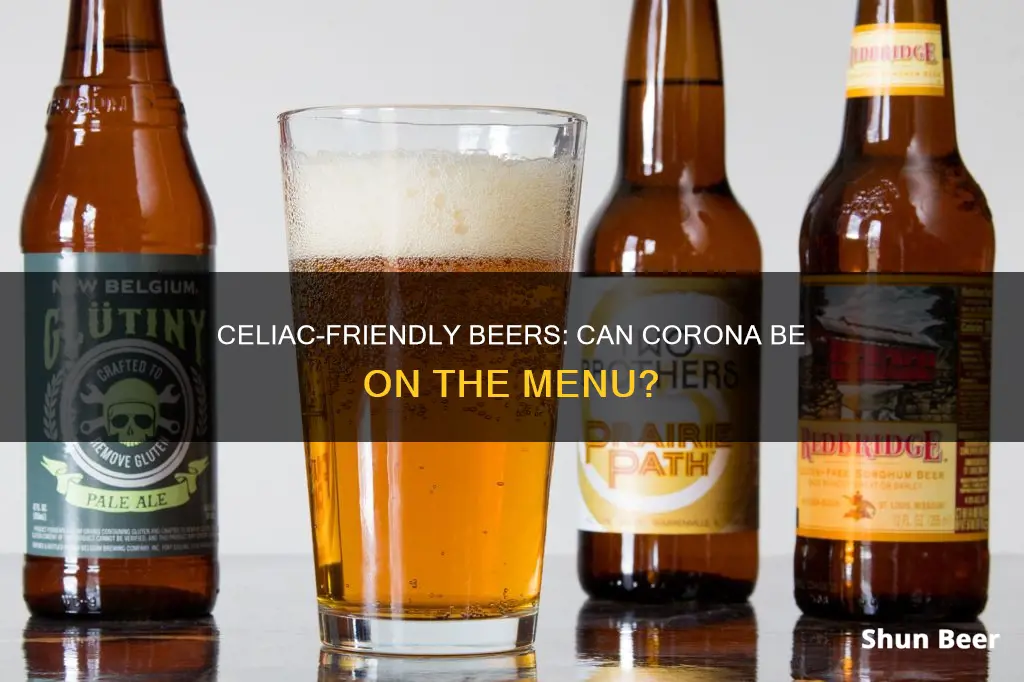
Celiac disease is a serious autoimmune disorder that can cause damage to the small intestine when foods with gluten are consumed. The only treatment for celiac disease is a strict gluten-free diet.
Corona beer is not gluten-free and contains barley, which is a gluten-containing grain. The company has processes in place that reduce the gluten content to below 20 parts per million (ppm). However, the Alcohol and Tobacco Tax and Trade Bureau (TTB) does not allow traditional beers to be labelled as gluten-free in the US if they are made with gluten-containing grains.
While some people with celiac disease may choose to drink Corona, it is not recommended as it may still cause damage to the intestines. There are many truly gluten-free beers available that are safer options for those with celiac disease.
| Characteristics | Values |
|---|---|
| Gluten-free | No |
| Gluten content | Less than 20ppm |
| Ingredients | Barley malt, rice and/or corn, hops, yeast, antioxidants (ascorbic acid), and propylene glycol as a stabilizer |
What You'll Learn
- Corona contains barley, a gluten-containing grain
- Corona tests below the 20ppm threshold for gluten-free products
- The FDA states that products with a gluten content below 20ppm are suitable for people with coeliac disease
- Corona cannot be labelled as gluten-free because it is made with barley
- Anecdotal evidence of feeling fine does not mean that damage isn't being done to your body

Corona contains barley, a gluten-containing grain
Corona beer is made with barley, which is a gluten-containing grain. The gluten count goes down due to various processes the company has in place, and Corona tests below the 20ppm threshold. However, the TTB (Alcohol and Tobacco Tax and Trade Bureau) does not allow traditional beer to be labelled "gluten-free" if it is made with a gluten-containing grain. Therefore, Corona cannot be labelled gluten-free under US law.
The gold standard test for detecting gluten in foods cannot accurately detect the level of gluten in beer, as the gluten in beer is broken down into fragments during the fermenting process. The test can only reliably detect gluten that is intact, so testing beer for gluten can lead to false negatives. This means you could get a result of <20ppm but the actual level of gluten in the product is much higher.
While some people with coeliac disease report being able to drink Corona without adverse effects, others have reported experiencing symptoms. Anecdotal evidence of "feeling fine" does not mean that damage isn't being done to your body, nor is it evidence that the beer doesn't contain gluten.
CO2 Cartridges: How They Keep Beer Fresh and Carbonated
You may want to see also

Corona tests below the 20ppm threshold for gluten-free products
The Food and Drug Administration (FDA) in the US has set a threshold of 20 parts per million (ppm) for gluten-free products. This means that any product containing less than 20ppm of gluten can be labelled as gluten-free.
Corona tests below this threshold, but it is not labelled as gluten-free. This is because it contains barley, which is a gluten-containing grain.
The Alcohol and Tobacco Tax and Trade Bureau states that products made from gluten-containing grains cannot be labelled as gluten-free. However, they can be labelled as 'processed', 'treated', or 'crafted' to remove gluten, with a qualifying statement warning that the gluten content cannot be determined and the product may contain gluten.
Beer Fast: Does It Work Quickly?
You may want to see also

The FDA states that products with a gluten content below 20ppm are suitable for people with coeliac disease
The U.S. Food and Drug Administration (FDA) has defined the term "gluten-free" and established conditions for the voluntary use of the term in the labelling of foods. According to the FDA, a product is gluten-free if it does not contain an ingredient that is a gluten-containing grain (e.g. wheat) or derived from a gluten-containing grain that has not been processed to remove gluten (e.g. wheat flour). Additionally, if a product is derived from a gluten-containing grain that has been processed to remove gluten (e.g. wheat starch), it can still be labelled gluten-free, as long as the use of that ingredient results in a gluten content of less than 20 parts per million (ppm). This limit is based on the available scientific evidence and is in line with standards in other countries.
The internationally agreed-upon maximum level of gluten considered safe for people with coeliac disease is 20 ppm or less. Research shows that this tiny amount is not toxic to people with coeliac disease, and they can eat unlimited amounts of products with a gluten level of 20ppm or less without adverse effects. This includes processed foods made from naturally gluten-free ingredients, some specialist substitute products, and uncontaminated oat products.
Corona is not a gluten-free beer, as it contains barley, which is a gluten-containing grain. However, it has been tested to contain less than 20ppm of gluten, which has caused some confusion. Despite having a gluten ingredient, it is still below the FDA's threshold to be considered gluten-free. However, since one of the ingredients contains gluten, it will not be labelled as gluten-free, at least in the US.
Quitting Beer Cold Turkey: Is It Possible?
You may want to see also

Corona cannot be labelled as gluten-free because it is made with barley
Corona beer is not gluten-free. It is made with barley, which is a gluten-containing grain. While the fermentation process significantly lowers the gluten content, there are still traces of gluten in Corona Extra, Corona Light, Corona Familiar, and Corona Premier.
The Alcohol and Tobacco Tax and Trade Bureau states that Corona cannot be labelled as gluten-free because it is made with barley.
According to the FDA, a product is considered gluten-free if it contains less than 20 parts per million (ppm) of gluten. However, the gluten content in Corona has not been officially tested, and the company itself states that the beer is not gluten-free.
While some people with celiac disease may not experience any symptoms after drinking Corona, it is important to note that even small amounts of gluten can cause intestinal damage. Therefore, it is recommended that those with celiac disease or gluten intolerance avoid Corona beer and opt for craft beers made from gluten-free ingredients instead.
Drinking Beer in the Back Seat: What's the Law?
You may want to see also

Anecdotal evidence of feeling fine does not mean that damage isn't being done to your body
Celiac disease is a serious autoimmune disorder where the ingestion of gluten leads to damage in the small intestine. This damage can occur even in the absence of noticeable symptoms. Therefore, the absence of symptoms is not a reliable indicator of the safety of consuming Corona or any other gluten-containing product.
Corona beer is not considered gluten-free, and this is an important distinction to make. While it may contain less than 20 parts per million (ppm) of gluten, which is the threshold set by the FDA for a product to be labeled gluten-free, it is still not recommended for individuals with celiac disease. The reason for this is twofold. Firstly, the tests used to detect gluten in beer may not be entirely accurate due to the breakdown of gluten during the fermentation process. Secondly, traditional beers like Corona, which are made with gluten-containing grains like barley, cannot be labeled gluten-free under U.S. law, even if they fall below the 20 ppm threshold.
It is essential to understand that just because someone does not experience noticeable symptoms after drinking Corona, it does not mean that the beer is safe for everyone with celiac disease. The absence of symptoms does not equate to the absence of damage, and consuming gluten in any form can potentially lead to intestinal harm for individuals with celiac disease. Therefore, it is generally recommended that those with celiac disease avoid Corona and opt for gluten-free alternatives to ensure their health and well-being.
Wisconson's Teen Beer Drinking Laws Explained
You may want to see also
Frequently asked questions
No, Corona beer is not gluten-free. It contains barley, which is a gluten-containing grain. However, due to various processes the company has in place, the gluten count goes down, and Corona tests below the 20ppm.
Celiacs are advised not to consume Corona beer. Even though it tests below 20ppm, it is not certified gluten-free and is known to cause reactions in some celiacs.
Some gluten-free beer options for celiacs include Ghostfish, Glutenberg, Ground Breaker, and Stone Brewery.







